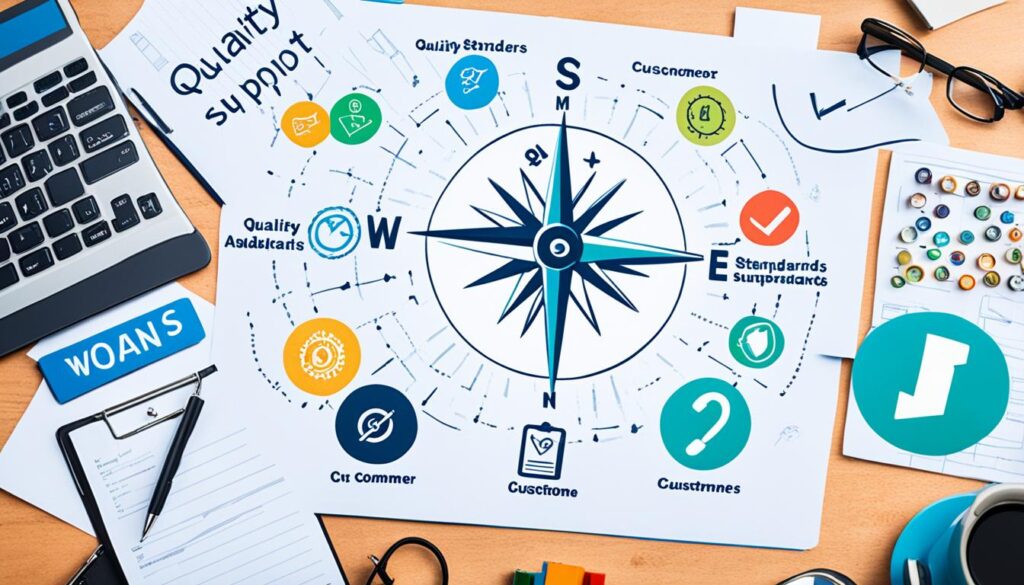Welcome to our guide on scaling customer support. As your business grows, it’s crucial to optimize your customer service operations to accommodate the increasing demands. Scaling customer support effectively involves finding the right balance between providing excellent customer service and managing your resources efficiently. In this article, we’ll explore strategies for scaling customer support and optimizing efficiency to ensure a seamless experience for your expanding customer base.
Key Takeaways:
- Scaling customer support is essential to meet the needs of a growing customer base and increasing inquiries.
- Benefits of scaling include improved customer experience, increased customer retention, enhanced support team efficiency, and added flexibility.
- Strategies for scaling customer support include deploying chatbots, using generative AI, building a knowledge base, and embracing an omnichannel approach.
- Understanding the triggers for scaling, such as adding new customers or supporting additional products, helps businesses identify the need for scaling customer support.
- Defining quality standards and continuously iterating the support model are essential for maintaining high-quality service while scaling.
Benefits of Scaling Customer Support
Scaling customer support brings several benefits that can greatly impact your business. By efficiently scaling your support efforts, you can enhance the overall customer experience, improve customer retention, boost support team efficiency, and achieve added flexibility in managing customer inquiries. These advantages play a crucial role in the success and growth of your business.
Improved Customer Experience
One of the key benefits of scaling customer support is the ability to provide an improved customer experience. As your customer base grows, scaling ensures that you can maintain high-quality support and timely responses, even with increased ticket volumes. This translates into happier and more satisfied customers, who are more likely to remain loyal to your brand.
Increased Customer Retention
Efficiently scaling your customer support efforts also contributes to increased customer retention. By providing excellent support throughout their buyer journey, you build stronger relationships with your customers and foster trust. Satisfied customers are more likely to stay with your brand, reducing churn and increasing customer lifetime value.
Enhanced Support Team Efficiency
Scaling customer support empowers your support team to perform at their best. By optimizing your support operations and implementing effective scaling strategies, you enable your team to handle customer inquiries more efficiently. This can include streamlining workflows, leveraging automation tools, and providing them with the resources they need to deliver exceptional support experiences.
Added Flexibility
Another significant benefit of scaling customer support is the added flexibility it brings to your business. By scaling your support efforts, you can better handle seasonal jumps in customer requests or steady growth in your customer base. This flexibility allows you to allocate resources effectively, ensuring that your customers receive prompt and satisfactory assistance.
Strategies for Scaling Customer Support
To effectively scale your customer support operations and optimize efficiency, consider implementing the following strategies:
- Deploy a chatbot for 24/7 support: Utilize artificial intelligence to deploy a chatbot that can handle common customer inquiries and provide assistance round the clock, ensuring a seamless support experience even outside of traditional working hours.
- Use generative AI to assist agents: Empower your support agents by equipping them with generative AI tools that can analyze customer interactions, suggest responses, and automate repetitive tasks, enabling them to focus on more complex inquiries.
- Appoint a customer service administrator: Designate a skilled individual as a customer service administrator who can oversee the support team, optimize workflows, and coordinate seamless communication between departments.
- Engage in proactive messaging: Be proactive in reaching out to customers to address potential issues before they arise. Implement automated messaging systems that can identify specific triggers and send timely notifications to customers.
- Build a knowledge base: Create a comprehensive knowledge base that contains frequently asked questions, troubleshooting guides, and informative resources, allowing customers to find answers to common queries independently.
- Create a community forum: Foster a sense of community by establishing a forum where customers can interact with each other, share experiences, and seek advice. This not only encourages self-help but also reduces the workload on your support team.
- Consider outsourcing: If your internal resources are stretched, consider outsourcing some aspects of customer support. Choose a reputable third-party service provider that can handle specific tasks or provide additional manpower during peak periods.
- Support your support team: Ensure your support team has access to the resources, training, and tools they need to excel. Regularly check in with team members to address any challenges they may face and provide necessary support.
- Embrace an omnichannel approach: Meet customers where they are by offering support through multiple channels such as email, phone, live chat, and social media. Provide a seamless experience across all channels, allowing customers to interact with your brand effortlessly.
- Automate tasks: Identify repetitive tasks within your support workflow and automate them using appropriate tools and software. This reduces manual effort, saves time, and improves overall efficiency.
- Hire qualified candidates: Invest in recruiting and hiring qualified individuals who possess the necessary skills and a customer-centric mindset. Prioritize candidates with a strong background in customer support and a passion for delivering exceptional service.
By implementing these strategies, you can efficiently scale your customer support operations while maintaining a high level of service and customer satisfaction.

Understanding the Need to Scale Customer Support
As your business grows and attracts more customers, it becomes increasingly important to scale your customer support operations. Several triggers can indicate the need for scaling, such as adding new customers, covering additional time zones, encouraging more conversations, offering new support channels, and supporting additional products or services. Each of these situations can lead to an increase in customer service interactions and the need for an efficient support system.
When you add new customers, it’s essential to ensure that your support team can handle the influx of inquiries effectively. As your customer base expands, the volume of customer interactions also grows, making scalability crucial for maintaining a high level of support.
Covering additional time zones is another factor that may require scaling. If you have customers from different parts of the world, it’s important to offer support during their local business hours. This ensures that customers receive prompt assistance and have access to help when they need it.
Encouraging more conversations with your customers is a sign of a healthy and engaged user base. However, it also means more interactions that need to be handled efficiently. Scaling your customer support allows you to meet this demand and maintain meaningful conversations with your customers.
Offering new support channels, such as live chat or social media platforms, can attract additional customers and provide them with more convenient ways to reach out for assistance. However, implementing these channels requires a scalable support system to manage the increased workload effectively.
Expanding your product or service offerings may also require scaling your customer support. When you introduce new products or services, you need to ensure that your support team has the capacity and knowledge to assist customers with inquiries related to these offerings.
Scaling customer support is essential to maintain high-quality service and meet the growing demands of your customer base. By recognizing these triggers and implementing efficient scaling strategies, you can provide outstanding support to your customers while driving the success of your business.

Defining Quality Standards for Customer Support
When it comes to providing top-quality customer support, it’s crucial to define and measure quality standards. While metrics like CSAT (Customer Satisfaction Score) and NPS (Net Promoter Score) offer valuable insights into customer perceptions, they may not fully capture the essence of quality. To ensure exceptional service, businesses should create their own internal quality measures that align with customer preferences and needs.
Creating a quality measure starts with a clear understanding of what constitutes outstanding service for your specific business and its customers. This measure should encompass factors such as promptness, accuracy, empathy, and resolution time. By defining these criteria, you can consistently deliver the level of support that exceeds customer expectations.
Regular evaluation and refinement of the quality measure are essential to keep pace with changes in your customer base and team size. As your business evolves, so do the expectations and demands of your customers. By continuously assessing and adapting your quality standards, you can ensure that your support remains exceptional.
“Quality is more than just meeting customer expectations; it’s about exceeding them and leaving a lasting positive impression.”
Remember, quality assurance is a continuous process. Regularly monitor and analyze customer feedback and team performance to identify areas for improvement. This data-driven approach allows you to identify trends, spot potential issues, and proactively address them before they impact customer satisfaction.
By defining and measuring quality standards for customer support, you establish a solid foundation for delivering exceptional service at all times.
The Role of Customer Service Quality Metrics
While CSAT and NPS provide valuable insights, they are just one piece of the puzzle. They focus on the customer’s perception of satisfaction and loyalty, rather than specific quality criteria. To truly measure and enhance customer service quality, it’s necessary to go beyond these traditional metrics.
CSAT: CSAT measures customer satisfaction by asking them to rate their experience after a support interaction. While it provides a snapshot of satisfaction, it does not capture the nuances that define quality service.
NPS: NPS measures customer loyalty and the likelihood of recommending a business to others. While it’s a valuable metric for gauging overall customer sentiment, it doesn’t provide in-depth insights into the quality of individual support interactions.
To create a more comprehensive understanding of quality, businesses should incorporate additional metrics such as first contact resolution (FCR), average response time, and customer effort score (CES) into their quality assessment process.
By combining these metrics with your internal quality measures, you can gain a holistic view of your support team’s performance and identify areas where improvements can be made.

Scaling Customer Support Options
When faced with the need to scale customer support, you have several options to consider. While increasing headcount might seem like the most straightforward approach, it can be costly and may not guarantee an improved support experience. Degrading the support experience is not a viable option as it can lead to dissatisfied customers and tarnish your brand reputation.
A more effective approach is to launch intelligent and cost-effective solutions that combine automation, self-service, customer prioritization, and reasonably paced hiring. By leveraging these strategies, you can scale your customer support operations without compromising the quality of service or incurring high costs.
Automation plays a key role in scaling efficiently. By implementing chatbots or AI-powered systems, you can handle common customer inquiries seamlessly and free up your support team’s time for more complex issues. Self-service options such as comprehensive knowledge bases and community forums also empower customers to find answers independently, reducing the dependency on direct support.
Customer prioritization is another important aspect of scaling customer support. By segmenting customers based on urgency and assigning dedicated teams to handle priority conversations, you can ensure timely assistance for critical issues. This approach helps improve response times and offers personalized support to your customers.
Reasonably paced hiring is crucial to maintaining the quality of support while scaling. Hiring qualified candidates gradually allows you to onboard and train new team members effectively, ensuring they align with your support values and deliver excellent customer service.

Embracing Automation for Efficient Scaling
Automation plays a crucial role in efficiently scaling customer support. By implementing automated solutions, businesses can optimize their support operations and enhance the overall customer experience.
One effective way to use automation is by deploying bots to resolve common customer questions. These bots can provide instant answers and solutions, freeing up valuable time for support agents to focus on more complex inquiries. Bots can also be used to route customers to the right teams, ensuring that each request is handled by the most appropriate agent.
Empowering customers through self-service options is another way to leverage automation for efficient scaling. By providing comprehensive FAQ pages and help centers, businesses enable customers to find answers independently. This reduces the reliance on direct support and allows support agents to allocate their time more effectively.

“Automation is the key to achieving efficient scaling. By using bots to resolve questions and route customers, businesses can streamline support operations and provide quicker assistance.”
– Customer Support Expert
Benefits of Embracing Automation:
- Increased efficiency in handling customer inquiries.
- Improved response times and reduced wait times.
- Consistent and accurate answers for common customer questions.
- Enhanced customer satisfaction through instant assistance.
- More efficient allocation of support agent resources.
By embracing automation, businesses can effectively scale their customer support while maintaining a high level of service. Automation not only streamlines support operations but also empowers customers to find answers independently, increasing self-service capabilities and reducing the overall support workload.
Prioritizing Customers for Efficient Support
When it comes to providing efficient support, prioritizing customers is crucial. By understanding their needs and urgency, businesses can ensure that critical customer issues receive prompt attention. Here are some strategies to effectively prioritize customers and enhance the support experience.
1. Customer Segmentation
Segmenting customers based on their characteristics, preferences, or purchase history allows businesses to tailor their support approach. By categorizing customers into different segments, you can identify high-priority individuals or groups who require immediate attention. This helps in allocating resources and addressing their concerns efficiently.
2. Smart Team and Customer Prioritization
Having a smart team that can quickly assess the urgency and importance of customer inquiries is essential. By training support agents to prioritize conversations effectively, you can improve response times and ensure that the most critical issues are addressed promptly. This helps in providing a better support experience to your customers.
3. Using Multiple Shared Inboxes
Managing customer support through multiple shared inboxes allows for better organization and allocation of conversations. By assigning specific inboxes to different teams or agents, businesses can distribute the workload and prioritize conversations based on urgency. This ensures that customer inquiries are handled efficiently and no important message is overlooked.
4. Continuously Refining Prioritization Strategies
To provide efficient support, it is essential to constantly evaluate and refine your prioritization strategies. Regularly analyze customer feedback, support metrics, and team performance to identify areas for improvement. By fine-tuning your prioritization approach, you can adapt to changing customer needs and ensure that critical issues receive the necessary attention.
“Prioritizing customers is not just about handling their inquiries quickly but also about understanding their needs and providing personalized support. By continuously refining our prioritization strategies, we can ensure that every customer feels valued and receives the assistance they require.” – [Your Company Name]
By effectively prioritizing customers, businesses can improve response times, enhance customer satisfaction, and ultimately provide a better support experience. Prioritization strategies such as customer segmentation, smart team and customer prioritization, using multiple shared inboxes, and continuous refinement are essential for delivering efficient support.
Continuous Iteration for Scaling Success
Continuous iteration is the key to successfully scaling your customer support operations. By regularly evaluating your current processes and administrative tools, you can identify inefficiencies and make necessary improvements. Experimenting with new strategies, such as implementing different response time tactics or using innovative inboxes, allows you to find the most effective approaches for your business.
It is crucial to continuously assess productivity metrics and analyze areas that impact employee engagement. By doing so, you can identify opportunities for improvement and create a work environment that fosters growth and satisfaction. Remember, engaged employees are more likely to provide exceptional support to your customers.
Embracing a culture of continuous iteration enables you to refine your support model and effectively scale your customer support. By staying proactive in evaluating and optimizing your processes, admin tools, and strategies, you can ensure your support operations are efficient, impactful, and aligned with the evolving needs of your business and customer base.
Through continuous iteration, you can maintain high-quality customer support, delivering the exceptional service your customers expect and deserve.
Scaling Support While Maintaining Principles
As your customer support operations scale, it is crucial to ensure that your core values and principles remain intact. Striking a balance between modern approaches and your organization’s cultural tenets is the key to successful scaling while preserving the customer support ethos.
Embracing automation is a powerful strategy for scaling customer support while maintaining your core values. By aligning automation with your cultural tenets, you can continue to provide a personal and empathetic support approach. Automation can help streamline processes, improve response times, and free up your support team to focus on complex customer interactions that require human touch.
“Automation enables businesses to scale their operations while maintaining their commitment to great customer and employee experience.”
– John Smith, Customer Support Expert
It is important to remember that while automation can enhance efficiency, it should never replace the human element in customer support. Your team’s expertise, empathy, and problem-solving capabilities are invaluable in creating exceptional customer experiences.
Another aspect of maintaining principles while scaling customer support is adapting your support strategy to align with your core values. This involves integrating your values into the training and development of your support team, ensuring that every customer interaction reflects your organization’s cultural tenets.
By emphasizing the importance of customer-centricity, empathy, and continuous improvement, you can foster a support culture that aligns with your core values. Regularly reinforcing these principles through training sessions, team meetings, and recognition programs will help sustain your support team’s commitment to delivering exceptional service.
Strategies for Scaling Support While Maintaining Principles:
- Embed your core values into customer support training programs
- Encourage teamwork and collaboration to reinforce cultural tenets
- Continuously evaluate and refine automation processes to align with your principles
- Empower your support team to make judgment calls guided by your core values
- Regularly gather customer feedback to assess the alignment between support interactions and your cultural tenets
By implementing these strategies, you can successfully scale your customer support operations while staying true to your organization’s principles. Remember, achieving scalable growth should never come at the expense of your core values. With a well-aligned support strategy, you can continue to provide excellent service and maintain the trust and loyalty of your customers.
Conclusion
To scale customer support efficiently, businesses must employ a combination of strategies that optimize their operations. By implementing automation, self-service options, effective customer prioritization, and continuous iteration, businesses can effectively scale their support while maintaining high-quality service.
Deploying chatbots and enhancing self-service options empowers customers to find solutions independently, reducing the burden on support teams. Prioritizing customers effectively ensures that critical issues receive prompt attention, improving response times and overall support experience.
Continuous evaluation and refinement of support processes are crucial for adapting to changing business needs and customer expectations. By embracing a culture of continuous iteration, businesses can refine their support model and successfully scale their customer support while providing outstanding service.
Scaling customer support efficiently is essential for meeting the growing demands of a growing customer base. By combining automation, self-service, customer prioritization, and continuous improvement, businesses can provide exceptional support while efficiently managing their resources.
FAQ
What is scaling customer support?
Scaling customer support refers to how businesses adapt their customer service operations to accommodate a growing customer base and increased inquiries. It involves finding a balance between providing good customer service and optimizing workforce and budget.
What are the benefits of scaling customer support?
Scaling customer support brings several benefits, including improved customer experience, increased customer retention, enhanced support team efficiency, and added flexibility.
What strategies can businesses use to scale customer support?
To effectively scale customer support, businesses can implement various strategies, including deploying a chatbot for 24/7 support, using generative AI to assist agents, appointing a customer service administrator, engaging in proactive messaging, building a knowledge base, creating a community forum, considering outsourcing, supporting the support team, embracing an omnichannel approach, automating tasks, and hiring qualified candidates.
What are the triggers for scaling customer support?
The need to scale customer support can be triggered by various factors, including adding new customers, covering additional time zones, encouraging more conversations, offering new support channels, and supporting additional products or services.
How can businesses define quality standards for customer support?
To ensure quality customer support, it is essential to define and measure quality standards. Businesses can use metrics like CSAT and NPS to gain insights into customer perceptions, but they should also create their own internal quality measures based on a clear understanding of what constitutes top-quality service for their specific business and customers.
What are the options for scaling customer support?
When faced with the need to scale customer support, businesses have three main options: increasing headcount, degrading the support experience, or launching intelligent and cost-effective solutions. The most effective approach involves a combination of automation, self-service, customer prioritization, and reasonably paced hiring.
How does automation help in scaling customer support?
Automation plays a crucial role in efficiently scaling customer support. Using bots to automatically resolve common customer questions and route customers to the right teams can free up support agents’ time and provide instant assistance. Empowering customers through self-service options, such as FAQ pages and help centers, allows them to find answers independently, reducing the need for direct support.
How can businesses prioritize customers for efficient support?
Prioritizing customers is essential for efficient support. Through customer segmentation and the use of multiple shared inboxes, businesses can prioritize conversations based on urgency and assign them to the appropriate teams. Continual refinement of prioritization strategies ensures that critical customer issues receive prompt attention.
Why is continuous iteration important for scaling customer support?
Continuous iteration is key to successfully scaling customer support. Regularly evaluating current processes and administrative tools for inefficiencies and making necessary improvements, experimenting with new strategies, and assessing productivity metrics help businesses identify areas for improvement and refine their support model.
How can businesses scale customer support while maintaining their principles?
Scaling customer support should not come at the expense of core values and principles. By aligning automation with their cultural tenets, businesses can maintain a personal and empathetic support approach. Striking a balance between modern approaches and core values ensures successful scaling while preserving the customer support ethos.
